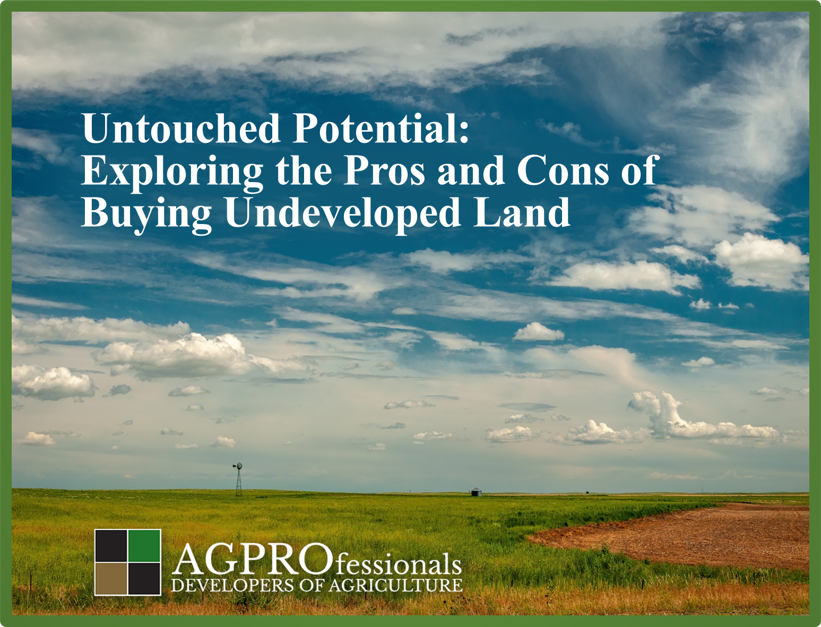Untouched Potential: Exploring the Pros and Cons of Buying Undeveloped Land
Investing in undeveloped land can be an exciting venture, offering a blank canvas for various possibilities; however, like any investment, buying undeveloped land has advantages and disadvantages.
Advantages
Flexibility and Creativity:
One of the primary advantages of buying undeveloped land is the freedom it provides for creativity and flexibility, whether you are purchasing commercial, residential, rural, or agricultural land. Our consulting group at AGPROfessionals is made up of civil, agricultural, and environmental engineers, as well as land planners and surveyors. We have the expertise to help you turn your vision and creativity into a reality.
Potential for Appreciation:
Undeveloped land has the potential for significant appreciation in value over time. As the demand for land increases in a particular area, mainly due to urban expansion or development trends, the value of undeveloped land can rise, offering an opportunity to realize a profitable return on investment.
Lower Initial Cost:
Undeveloped land often comes with a lower initial cost than developed properties. This can be advantageous for investors looking to enter the real estate market or individuals seeking a more affordable option for a future home or other real estate development project.
Tax Benefits:
In some cases, owning undeveloped land may come with tax benefits. Depending on local regulations, you may be eligible for property tax incentives or conservation easements that can positively impact your financial position. However, you can’t typically depreciate vacant land. That is why investing in infrastructure improves your land and tax advantages.
Disadvantages
Development Costs and Time:
While undeveloped land offers a blank canvas, developing it to suit your needs can be time-consuming and costly. Expenses related to infrastructure development, like road access, permits, zoning approvals, and utility installations like power, water, and sewer/septic, can add up, and realizing your vision may take years. Our team of engineers at AGPROfessionals has the expertise to design functional and cost-effective solutions to those issues.
Market Volatility:
The value of undeveloped land is susceptible to market fluctuations and external economic factors. Economic downturns can impact the demand for land, potentially affecting the resale value or the feasibility of your development plans.
Zoning and Regulatory Challenges:
Zoning regulations and land-use restrictions can pose significant challenges when developing raw land. Understanding and navigating these regulations can be complex, and unexpected restrictions may limit your intended use of the property. Fortunately, our AGPROfessionals Consulting Group team has land use, planning and zoning expertise. It can help you determine the feasibility of a new project and walk you through the process.
Lack of Immediate Income:
Unlike developed properties that generate rental income or are quickly resold for profit, undeveloped land may not provide immediate financial returns for years. Holding and maintaining the property without generating income can financially strain some investors.
Environmental and Site Challenges:
Undeveloped land may have unforeseen environmental challenges, such as soil quality issues, drainage problems, or endangered species habitats. Assessing and mitigating these challenges can add complexity to the development process.
Buying undeveloped land can be a rewarding investment for those willing to navigate its complexities and uncertainties. The potential for creative expression, long-term appreciation, and environmental stewardship are appealing aspects; however, it is crucial to carefully weigh the disadvantages, such as development costs and regulatory challenges, before embarking on this journey. With thorough research, a clear vision, and a realistic understanding of the risks involved, purchasing undeveloped land can be a strategic and fulfilling investment. At AGPROfessionals, we have the expertise to help guide you through the process.

